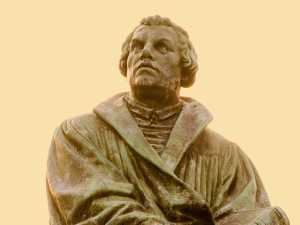by Rev. Paul Doellinger
 The propensity of the sinner is to trust in the visible works of the Law; to place our confidence in our own deeds, rather than the saving act of Jesus’ death and resurrection. The Law gives us something to follow and do. If we keep it, we feel secure and accomplished. While doing good works of the Law can be seen and felt, it doesn’t take any work on our part for us to hear and believe (this is the work of the Holy Spirit). The Law might make us feel secure in ourselves because we can keep, book, and track our obedience, but only the Gospel of all sins forgiven for Jesus’ sake preached, heard, and believed can give us the certainty of salvation.
The propensity of the sinner is to trust in the visible works of the Law; to place our confidence in our own deeds, rather than the saving act of Jesus’ death and resurrection. The Law gives us something to follow and do. If we keep it, we feel secure and accomplished. While doing good works of the Law can be seen and felt, it doesn’t take any work on our part for us to hear and believe (this is the work of the Holy Spirit). The Law might make us feel secure in ourselves because we can keep, book, and track our obedience, but only the Gospel of all sins forgiven for Jesus’ sake preached, heard, and believed can give us the certainty of salvation.
Read Galatians 4:21-31.
1. God promised Abraham a son through whom would come a numerous offspring and great blessing. Still childless, the elderly Abraham and his wife took matters into their own hands by arranging for Abraham to go to his servant Hagar, who bore a son named Ishmael. Later Isaac was born to Abraham and Sarah. Luther notes that with Ishmael, “There was no statement from God that preceded, as there was when Sarah gave birth to Isaac, but only the statement of Sarah, it is abundantly clear that Ishmael was son only according to the flesh without the Word.”[1] What did Isaac’s birth have that Ishmael’s lacked?
2. Paul illustrates the difference between the old and new covenants using Hagar as Mt. Sinai and Sarah as Jerusalem. The Law given on Mt. Sinai could be seen and observed, but the promise given through the Word must be heard and believed. Luther comments, “Therefore Sarah, or Jerusalem, our free mother, is the Church, the bride of Christ who gives birth to all…as she exercises the ministry of the Word…Now she teaches the Gospel in such a way that we are set free from the curse of the Law, from sin, death, and other evils, not through the Law and works but through Christ. (She) is not subject to the Law and works; but she is free and is a mother without Law, sin, or death. And as the mother is, so are the children to whom she gives birth.”[2] How is one born into the Church?
3. The world seeks works of the Law, not faith in the Gospel, or as Luther puts it, “For men of every age…do not see any other righteousness than that of the Law…Therefore if they follow the Law and perform its outward works, they think they are righteous. All such men are slaves and not free men, because they are sons of Hagar, who gives birth to slavery…Therefore, they remain under the curse of the Law, under sin, death, and the power of the devil, under the wrath and judgment of God.” [3] How do you know that you are part of the Church? By works or by “hearing with faith (Gal. 3:5)?”
4. “The true church seems to be barren; for the Gospel, the word of the cross, which the church preaches, is not as brilliant as is the teaching about the Law and works, and therefore it has few people who cling to it. Besides, it has the reputation of forbidding good works, making men idle and faint, stirring up heresies and sedition, and being the cause of every evil. Therefore, it does not seem to have any success or prosperity; but everything seems to be filled with bareness, waste, and despair…but ‘the Word of the Lord will abide forever’ (1 Pet. 1:25). Regardless of how barren and deserted the church of Christ seems…it alone gives birth to children and heirs, through the ministry of the Word.”[4] What are the marks of the true Church?
5. “But those who try to achieve the status of sons and heirs by the righteousness of the Law or by their own righteousness are slaves, who will never receive the inheritance even though they work themselves to death with their great effort; for they are trying, contrary to the will of God, to achieve by their own works what God wants to grant believers by sheer grace for Christ’s sake. Believers do good works; but they do not become sons and heirs through this, for this has been granted them by their birth. Now that they have become sons for Christ’s sake, they glorify God with their good deeds and help their neighbor.”[5] How does one know if they are “children of the slave” or of the “free woman?” Since our works do not justify, what role, then, do they play in the life of the Christian?
Abraham could neither observe nor feel the promise of God. In fact, all evidence and experience seemed to contradict God’s promise—that his ninety-year-old wife would conceive and bear a son. Ishmael, born according to the flesh and arrangement of Abraham, was someone he could see and track and thus place confidence in. What ultimately saved Abraham was faith in the Word of promise, not his own works or doing. God promised blessing through Isaac, so that from Sarah would come the promised Christ generations later. “(Abraham) believed the Lord, and he counted to him as righteousness” (Gen. 15:6).
 The Lord counts your faith as righteousness. You are given to believe some extraordinary things that you cannot see or feel: that your sins are forgiven, that your baptism rescues you from sin, death, and hell; that you will be raised from the dead and given everlasting life. We might be tempted to look to our works for the certainty of our salvation; to hang our hats on our good deeds of the Law. But the Law and works provide no security or confidence in the face of death and hell. “We walk by faith, not by sight” (2 Cor. 5:7). Hear the promise of God in the Word. Look not to your works. Like Isaac, you are children of the promise, born out of Sarah, the Church, in which God births you by water and the Spirit (John 3:5). In this Church, “our Jerusalem above,” God forgives your sins through faith in Jesus. You are not children of slavery, sin, death, and the Law. You are heirs of freedom, forgiveness, the Gospel, and life everlasting.
The Lord counts your faith as righteousness. You are given to believe some extraordinary things that you cannot see or feel: that your sins are forgiven, that your baptism rescues you from sin, death, and hell; that you will be raised from the dead and given everlasting life. We might be tempted to look to our works for the certainty of our salvation; to hang our hats on our good deeds of the Law. But the Law and works provide no security or confidence in the face of death and hell. “We walk by faith, not by sight” (2 Cor. 5:7). Hear the promise of God in the Word. Look not to your works. Like Isaac, you are children of the promise, born out of Sarah, the Church, in which God births you by water and the Spirit (John 3:5). In this Church, “our Jerusalem above,” God forgives your sins through faith in Jesus. You are not children of slavery, sin, death, and the Law. You are heirs of freedom, forgiveness, the Gospel, and life everlasting.
The Rev. Paul M. Doellinger is pastor of St. Paul Lutheran Church, Cassopolis, Mich.
[1] Luther, Martin. Luther’s Works, vol. 26: Lectures on Galatians, 1535, Chapters 1-4 (J. J. 2Pelikan, H. C. Oswald & H. T. Lehmann, Ed.). Saint Louis: Concordia Publishing House, 1963., pg. 435
[2] Ibid. pg. 441
[3] Ibid. pg. 442-443
[4] Ibid. pg. 443-444
[5] Ibid. pg. 449
